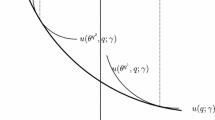Abstract
This paper proposes a methodological strategy for cost–benefit analysis (CBA) which does not require the assumption that individuals’ preferences satisfy standard coherence conditions, and so renders CBA immune to the problems generated by preference anomalies. The proposal treats CBA as an exercise in market simulation, based on the measurement of surplus. Anomalies occur when surplus measurements vary according to the hypothetical payment mechanism used. In such cases, the mechanism that is the “closest market analogue” should be used. This approach is used to resolve problems associated with some familiar anomalies, including inconsistencies between “citizen” and “consumer” valuations, and endowment effects.
Similar content being viewed by others
References
Bardsley, N. and R. Sugden (forthcoming), ‘Human nature and sociality in economics’, in S.-C. Kolm and J. Mercier Ythier, eds., The Economics of Giving, Reciprocity and Altruism, Amsterdam: North Holland.
I. Bateman (2002) Economic Valuation with Stated Preference Techniques: A Manual Cheltenham Edward Elgar
I. Bateman A. Munro B. Rhodes C. Starmer R. Sugden (1997) ArticleTitle‘A Test of the Theory of Reference-Dependent Preferences’ Quarterly Journal of Economics 112 479–505 Occurrence Handle10.1162/003355397555262
K. Binmore (1999) ArticleTitle‘Why Experiment in Economics?’ Economic Journal 109 F16–F24 Occurrence Handle10.1111/1468-0297.00399
C. Camerer (1989) ArticleTitle‘An Experimental Test of Several Generalized Utility Theories’ Journal of Risk and Uncertainty 2 61–104 Occurrence Handle10.1007/BF00055711
C. Camerer (1995) Individual Decision Making J. H. Kagel A. E. Roth (Eds) Handbook of Experimental Economics Princeton University Press Princeton, NJ
A. Deaton J. Muellbauer (1980) Economics and Consumer Behavior Cambridge University Press Cambridge
E. Fehr S. Gächter (2000) ArticleTitle‘Cooperation and Punishment in Public Goods Experiments’ American Economic Review 90 980–994 Occurrence Handle10.1257/aer.90.4.980
A. Gibbard (1973) ArticleTitle‘Manipulation of Voting Schemes: A General Result’ Econometrica 41 587–602 Occurrence Handle10.2307/1914083
W. M. Hanemann (1999) The Economic Theory of WTP and WTA I. Bateman K. Willis (Eds) Valuing Environmental Preferences: Theory and Practice of the Contingent Valuation Method in the US, EC and Developing Countries Oxford University Press Oxford
S. Hargreaves Heap (2002) Everybody is Talking About it: Intersubjectivity and the Television Industry E. Fullbrook (Eds) Intersubjectivity in Economics Routledge London
J. Hey C. Orme (1994) ArticleTitle‘Investigating Generalizations of Expected Utility Theory Using Experimental Data’ Econometrica 62 1291–1326 Occurrence Handle10.2307/2951750
J. Hicks (1943) ArticleTitle‘The Four Consumer Surpluses’ Review of Economic Studies 8 108–116
Kahneman, D. and R. Sugden (2005), ‘Experienced Utility as a Standard of Policy Evaluation’, Environmental & Resource Economics 32, 161--181 (this issue).
D. Kahneman J. Knetsch R. Thaler (1990) ArticleTitle‘Experimental Tests of the Endowment Effect and the Coase Theorem’ Journal of Political Economy 98 1325–1348 Occurrence Handle10.1086/261737
D. Kahneman A. Tversky (1979) ArticleTitle‘Prospect Theory: An Analysis of Decision Under Risk’ Econometrica 47 263–291 Occurrence Handle10.2307/1914185
D. Kahneman C. Varey (1991) Notes on the Psychology of Utility J. Elster J. Roemer (Eds) Interpersonal Comparisons of Well-Being Cambridge University Press Cambridge 127–163
Knetsch, J. (2005), ‘Gains, Losses, and the USA–EPA Economic Analyses Guidelines: A Hazardous Product?’, Environmental & Resource Economics 32, 91--112 (this issue).
List, J. (2005), ‘Scientific Numerology, Preference Anomalies, and Environmental PolicyMaking’, Environmental & Resource Economics 32, 35--53 (this issue).
G. Loewenstein (1999) ArticleTitle‘Experimental Economics from the Viewpoint of Behavioural Economics’ Economic Journal 109 F25–F34 Occurrence Handle10.1111/1468-0297.00400
G. Loewenstein D. Adler (1995) ArticleTitle‘A Bias in the Prediction of Tastes’ Economic Journal 105 929–937 Occurrence Handle10.2307/2235159
G. Loewenstein J. Elster (Eds) (1992) Choice over Time Russell Sage Foundation New York
G. Looomes C. Starmer R. Sugden (2003) ArticleTitle‘Do Anomalies Disappear in Repeated Markets?’ Economic Journal 113 IssueID2003 C153–C166 Occurrence Handle10.1111/1468-0297.00108
A. Munro R. Sugden (2003) ArticleTitle‘On the Theory of Reference-Dependent Preferences’ Journal of Economic Behavior and Organization 50 407–428 Occurrence Handle10.1016/S0167-2681(02)00033-1
C.R. Plott (1996) Rational Individual Behaviour in Markets and Social Choice Processes: The Discovered Preference Hypothesis K. J. Arrow E. Colombatto M. Perlman C. Schmidt (Eds) The Rational Foundations of Economic Behaviour Macmillan Basingstoke
J. Shogren S. Cho C. Koo J. List C. Park P. Polo R. Wilhelmi (2001) ArticleTitle‘Auction Mechanisms and the Measurement of WTP and WTA’ Resource and Energy Economics 23 97–109 Occurrence Handle10.1016/S0928-7655(00)00038-5
C. Starmer (1999) ArticleTitle‘Experimental Economics: Hard Science or Wasteful Tinkering?’ Economic Journal 109 F5–F15 Occurrence Handle10.1111/1468-0297.00398
C. Starmer R. Sugden (1989) ArticleTitle‘Violations of the Independence Axiom in Common Ratio Problems: An Experimental Test of Some Competing Hypotheses’ Annals of Operations Research 19 79–102 Occurrence Handle10.1007/BF02283515
R. Sugden (1999a) Public Goods and Contingent Valuation I. Bateman K. Willis (Eds) Valuing Environmental Preferences: Theory and Practice of the Contingent Valuation Method in the US, EC and Developing Countries Oxford University Press Oxford
R. Sugden (1999b) Alternatives to the Neoclassical Theory of Choice I. Bateman K. Willis (Eds) Valuing Environmental Preferences: Theory and Practice of the Contingent Valuation Method in the US, EC and Developing Countries Oxford University Press Oxford
R. Sugden (2003) Conceptual Foundations of Cost-Benefit Analysis: A Minimalist Account A. Pearman P. Mackie J. Nellthorp (Eds) Transport Projects, Programmes and Policies: Evaluation Needs and Capabilities Aldershot Ashgate
R. Sugden (2004) ArticleTitle‘The Opportunity Criterion: Consumer Sovereignty without the Assumption of Coherent Preferences’ American Economic Review 94 1014–1033 Occurrence Handle10.1257/0002828042002714
A. Tversky D. Kahneman (1991) ArticleTitle‘Loss Aversion in Riskless Choice: A Reference-Dependent Model’ Quarterly Journal of Economics 106 1039–1061 Occurrence Handle10.2307/2937956
Author information
Authors and Affiliations
Corresponding author
Additional information
JEL classifications: D61, D63, Q51
Rights and permissions
About this article
Cite this article
Sugden, R. Coping with Preference Anomalies in Cost–Benefit Analysis: A Market-Simulation Approach. Environ Resource Econ 32, 129–160 (2005). https://doi.org/10.1007/s10640-005-6031-5
Accepted:
Issue Date:
DOI: https://doi.org/10.1007/s10640-005-6031-5




